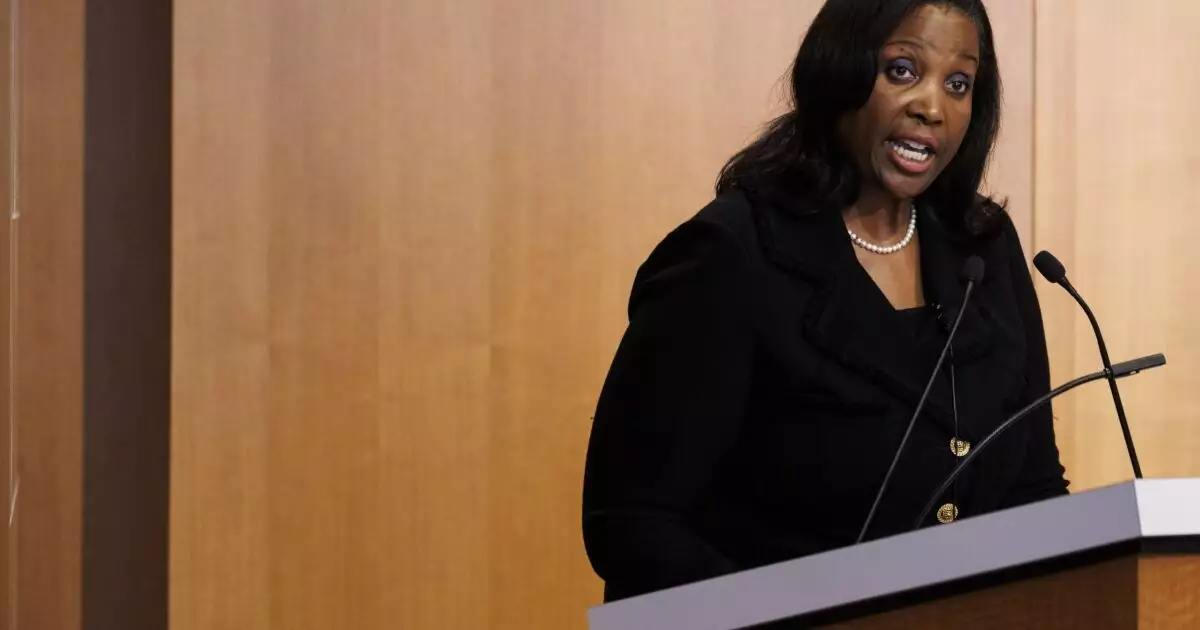In recent days, the spectacle surrounding Federal Reserve Governor Lisa Cook’s alleged mortgage misstatements has revealed a disturbing trend: the encroachment of political motives into the supposedly independent realm of monetary policy. The vocal demands by former President Donald Trump for her resignation, fueled by accusations of dishonesty, are emblematic of an unsettling shift that risks undermining the very foundation of the Federal Reserve’s autonomy. Historically, the Fed has been shielded from political pressure to preserve its ability to make data-driven decisions free from partisan influence. Yet, the recent inclination to threaten removal based on political disagreements or personal attacks signals a troubling erosion of this principle.
What makes this situation particularly alarming is the growing narrative that judges, regulators, and independent agency officials are fair game for political retribution if their actions or backgrounds do not align with specific partisan goals. Trump’s explicit threat to fire Cook if she does not voluntarily resign exemplifies a broader strategy—the belief that the President or political allies should wield ultimate authority over the very individuals entrusted with safeguarding the nation’s financial stability. This not only jeopardizes the integrity of monetary policy but also threatens to politicize an institution that’s crucial for maintaining economic order and confidence.
The Myth of “For Cause”: A Legal and Political Tightrope
The constitutional and legal protections that shield Federal Reserve Governors from arbitrary removal are grounded in decades of judicial precedent. The 1935 Supreme Court decision in Humphrey’s Executor v. United States essentially declared that members of independent agencies cannot be dismissed solely for political reasons. The standard set by this ruling emphasizes “cause”—a nebulous concept encompassing misconduct or neglect, but not mere disagreements with policy. However, the current political climate suggests a willingness to challenge this boundary, arguing that significant allegations or political motives can justify firing officials who are meant to serve long-term, insulated terms.
This blurred line between legitimate cause and politically motivated firing threatens to distort the core independence of the Fed. If the executive branch’s authority is interpreted broadly, it could lead to a democracia where economic policy is as susceptible to shifting political winds as any other partisan battlefield. Such a precedent would weaken the central bank’s ability to operate as a non-partisan institution, potentially leading to unpredictable monetary actions and a loss of credibility among investors and international markets.
The Unitary Executive Theory: Power Consolidation or Political Overreach?
The Trump administration’s embrace of the unitary executive theory adds a layer of complexity to this debate. By asserting that the President holds total authority over executive agencies and officials, Trump has demonstrated a pattern of sidelining or dismissing appointees who oppose his policies or political interests. His administration’s record of firing officials at independent agencies underscores a broader effort to consolidate power—not just for ideological consistency, but to exert control over financial regulatory and oversight mechanisms.
This approach raises serious questions about the long-term health of American governance. While the Supreme Court has historically acknowledged the independence of certain institutions, it has also tended to side with executive authority in matters of administrative law, especially under recent conservative interpretations. By targeting Fed officials and other regulators, the current trend risks transforming the nation’s economic institutions from guardians of stability into pawns of partisan politics. If the pattern continues, the delicate balance of independence that has historically protected the economy from political whims could be irrevocably compromised.
Implications for Market Stability and Democratic Integrity
The impact of politicizing the Federal Reserve extends beyond legal debates—it penetrates the very fabric of market stability and democratic governance. Investors rely on the Fed’s decisions being free from partisan influence, ensuring that adjustments to interest rates are based on economic conditions rather than political expediency. When political figures threaten or attempt to influence appointments and policy decisions under the guise of moral or personal misconduct, it creates a climate of uncertainty that can ripple through markets, increase borrowing costs, and destabilize economic growth.
From a broader democratic perspective, deliberately undermining the independence of key institutions erodes public trust. Citizens expect that economic policies are crafted based on rational analysis and expert judgment, not political retribution threatened by pseudo-scandals or partisan combat. If the current trajectory persists, Americans may come to view their institutions not as neutral arbiters but as battlegrounds for partisan power struggles—an outcome that would severely undermine the stability and legitimacy of a free society rooted in the rule of law.
—
While political accountability is essential in a democracy, the degree to which it infiltrates and threatens the independence of institutions like the Federal Reserve is perilous. The attempts to politically weaponize personnel decisions and undermine legal protections set a dangerous precedent—one that could severely weaken America’s economic sovereignty and democratic integrity. The challenge lies in protecting these institutions from partisan misuse while maintaining transparency and accountability, but recent developments suggest we are veering dangerously far from this ideal.

